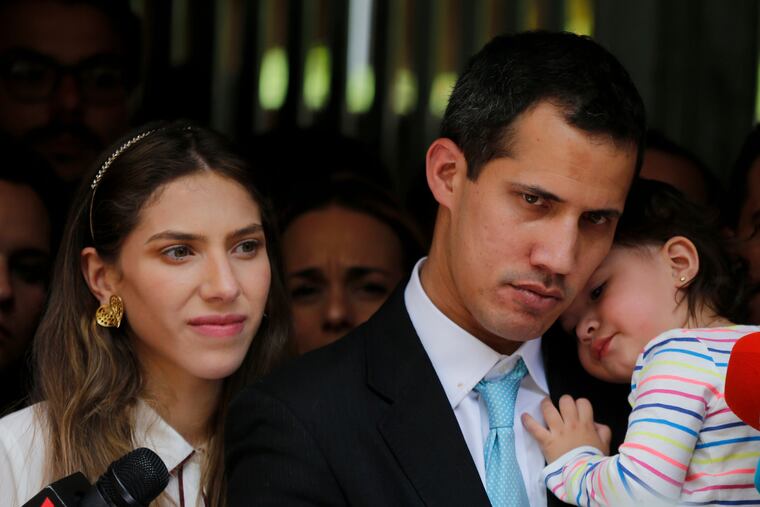Guaido to police: Don’t cross red line with my family
The Venezuelan opposition leader challenging Nicolas Maduro's claim to the presidency warned officers from a feared state security unit Thursday to stay away from his family after he accused them of showing up at his apartment.

CARACAS, Venezuela (AP) — The Venezuelan opposition leader challenging Nicolas Maduro's claim to the presidency warned officers from a feared state security unit Thursday to stay away from his family after he accused them of showing up at his apartment in a tense brush with the very force he is trying to persuade to switch allegiance and back him.
A visibly flustered but determined Juan Guaido told a crowd gathered at a university that members of a special police unit known for its brutal tactics had gone to his high-rise apartment in a middle-class neighborhood of Caracas while his 20-month-old daughter was inside.
Guaido said four agents from the police's Special Action Force arrived at the building asking for his wife, who owns the unit. Guaido had been living there with his family until recently, when he began changing locations as a security precaution amid the current crisis.
"I hold you responsible for anything that might happen to my baby," the 35-year-old lawmaker said as his wife stood beside him.
In a statement on Twitter, Venezuela's police denied that special agents had gone to Guaido's home, dismissing the claim as "totally FALSE."
Guaido is at the center of Venezuela's political upheaval as he presses forward with establishing a transitional government after swearing himself in as the nation's rightful president in a move denounced by Maduro as a U.S.-backed coup.
In a country where the socialist leader's foes often end up behind bars, Guaido has thus far managed to avoid arrest, but in recent days authorities have let it be known that even as his powerful international support grows Guaido isn't untouchable.
On Tuesday, the government-stacked Supreme Court barred Guaido from leaving the country and froze his bank accounts while chief prosecutor Tarek William Saab, a Maduro ally, conducts an investigation into his anti-government activities.
"Once more they are playing the intimidation game and once more it has gone bad for them," Guaido said later Thursday outside his family's home as supporters cheered. "Children are sacred. Wives are sacred. So don't cross that red line."
Even while denouncing the special police force, Guaido appealed to them and the military to abandon Maduro and abide by the constitution, which he contends instructs him as leader of the opposition-controlled National Assembly to take the presidency. The opposition and a large segment of the international community consider Maduro's reelection fraudulent, in part because the president's most popular adversaries were barred from running.
"You have time to put yourselves on the right side of history," Guaido said.
A swift end to the tumult appears unlikely as both Guaido and Maduro dig in for a protracted conflict with geopolitical dimensions.
Maduro has been crisscrossing Venezuela overseeing military exercises and vowing to defend his socialist government no matter the cost. The military's top leadership is backing Maduro, though analysts warn that rank-and-file troops frustrated by their country's economic and humanitarian crisis may not share their unwavering loyalty.
Venezuelan officials said Thursday that authorities had taken down a "terrorist" group backed by political opponents plotting to assassinate Maduro. Interior Minister Nestor Reverol said National Guard Col. Oswaldo Garcia Palomo was among those detained. Garcia Palomo has been an outspoken critic of Maduro for months and had openly declared his intentions to amass a military force in exile to remove Maduro from power.
Reverol said security forces seized two rifles and 500 armbands bearing the letters "OC," which he said stands for "Operation Constitution." He accused Colombian intelligence, the CIA and exiled Venezuelan lawmaker Julio Borges of being behind the alleged plot.
"We are continuing the investigation and don't discount future arrests," he added.
Though Maduro has retained the support of powerful allies, including Russia and China, he is growing increasingly isolated as more nations back Guaido.
The European Parliament called on the European Union's 28 member states Thursday to recognize Guaido. The regional bloc has not yet defined its position on the crisis amid differing opinions among members, though several nations have said they will recognize Guaido if Maduro doesn't announce a new election by week's end.
The bloc did not come out in support of Guaido after a meeting of foreign ministers in Bucharest, Romania, to discuss the crisis, but EU foreign policy chief Federica Mogherini announced the establishment of a 90-day international conduct group with EU and Latin American states to "promote common understanding aiming at a peaceful and democratic outcome."
The EU legislature also approved a resolution that condemned the continued violence and the detention of journalists who sought to cover events there.
In recent days journalists from at least three foreign publications have been detained. Spain's state-run EFE news agency said three of its journalists were freed Thursday after being detained overnight in Venezuela's capital. Two French journalists were also freed from detention, and two Chilean journalists were ordered deported.
__
Armario reported from Bogota, Colombia. Associated Press journalists Fabiola Sanchez and Scott Smith in Caracas contributed to this report.